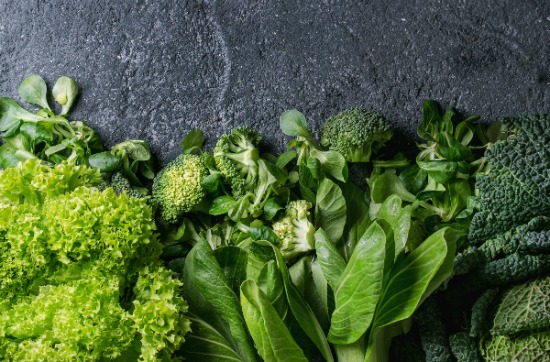Getting your daily dose of greens seems difficult for most people on a sunny day in the summer when they have those vegetable readily available. But come winter time, some all but stop eating those nutritious veggies that help keep the body running in tip-top condition. Because of that, we’ve come up with this helpful guide to show you how easy it is to still get your veggies in even when that blizzard rolls through!
Dark leafy greens like spinach, kale, or swiss chard are one of the items missing out of winter diets and can easily be grown indoors, but are often put on the wayside. That is unfortunate because those veggies are packed full of essential vitamins and nutrients. The United States Dietary Association (USDA) food guide also underscores this necessity. The food pyramid states that most adults need only 3 cups (servings) of leafy greens per day, but nutrition and health experts say that number is actually 5-9 cups per day, depending on your size. But that number is daunting to so many – even when conditions are ripe to consume that amount of leafy greens.
But the easiest way to make sure you’ve got enough is to simply eat a big salad for either lunch or dinner taking care of your leafy greens for the day. Of course, feel free to add any other vegetables you may like so the salad is flavored to your taste. After all, you’ll be trying to eat the entire thing in one sitting. Also, you should consider eating some healthy fat with the salad. You can try drizzling olive oil on it. You will want to add some healthy fats to your leafy green salad because many of the essential vitamins and minerals in those hearty leafy greens are fat soluble, meaning your body will not break them down for use unless they are in the presence of fat. If you dislike the idea of an oily salad, consider cutting up an avocado and tossing that in! Avocados have enough fat to help your body digest those fat-soluble nutrients!
Another helpful tip is to use your freezer! Leafy greens, such as kale or spinach from your garden (not lettuce, only because it won’t hold up that well in the freezer) can be washed, precut, and put in your freezer for winter use. I personally do this, and use the frozen greens to make green smoothies that even my kids enjoy – and beg for if you can believe it! (The secret is one frozen banana tossed into the blender with all those greens.) Spinach, kale, and swiss chard are all great options for not only freezing but green smoothies! Make sure to toss in your avocado (which will help make the smoothie creamy) or add a bit of olive oil or other natural oil, such as organic peanut butter, almond butter, or cashew butter! Remember, you’ll need some of these to add fat so that your body absorbs all of those fat-soluble nutrients. I also have been known to toss in some hemp hearts for a little bit of a protein boost too! Hemp oil is also a great addition with 9.47 g of protein – you can’t go wrong! This is all personal preference, and instead of following a recipe, my suggestion is to grab your leafy greens and start blending until you’ve come up with a concoction that you love and will actually enjoy consuming. Ginger, stevia, and blueberries could also be added. My friend puts pineapple in her green smoothie! Just use your imagination and ingredients you love, and soon enough, you’ll be getting your daily dose of greens in just one delicious smoothie!
For those who may need to start a little slower, consider measuring out your greens first thing in the morning. If you need 6 cups, simply prepare it, put it in a container, and have it in your fridge so you know you’ll need to consume it by the end of the day. This way, you can see how much you have left and how much you will need to eat for dinner. For those who work, this is also an easy and quick way to go about getting enough vegetables in the winter. Precut your salads for the work week and simply take them with you.
Another helpful tip is to switch to frozen greens in the winter. Stock your freezer with your own garden greens and veggies, or buy flash frozen veggies from the store. The leafy green section of the grocery store in my neck of the woods is pretty sad during the colder months because of my location. But there is usually a good selection of frozen organic greens that can be used to supplement those I have saved and frozen from the summer garden. I toss them into soups and stews and sometimes just pan fry some frozen spinach with butter, chopped garlic, and some salt. (This is also a treat the kids just love and can’t seem to get enough of!) Plus, you get the added bonus of the immune boost from the garlic, so it’s really a win-win!
If all of this sounds too time-consuming still to prepare salads and make green smoothies, try a green powder. Super Green is power-packed with over 40 different nutrients the body needs all in one small scoop. Just stir it into pure water or add to a protein shake or protein water and you’ve just taken care of your body’s daily need for dark leafy green vegetables. *This shouldn’t be a long-term solution. The goal should be to actually consume your greens and get the nutrients from food, but this will definitely add that nutritional boost. It is also a great way for beginners to get on track for a healthy lifestyle!
These are just a few simple and easy ways to help you make sure you give your body the nutrients it needs even during the wintertime. If you have any helpful tips or tricks you’d like to share with us and with others on how you give your body the proper dose of vegetables even when it’s cold outside, we’d love to hear it! Share a comment with us!

This article was originally published at Ready Nutrition™ on January 4th, 2019








i think the pyramid says 5-9 half cup servings, so not as hard to meet that goal. of course, that assumes you think the government has the right answers on nutrition…
Thanks, Emmer – I look at it like I look at many studies, as a researched recommendation. I know what is best for my health and ultimately choose what I put in my body.
The government food pyramid has never been anything but a tool to support whatever sector of the Ag economy pays in the most. All of these people who claim to distrust the Government but think of the food pyramid as valuable guidance crack me up. That said, I sure do like me some greens, love that cabbage and broccoli,too. If you want to add fat to your greens don’t fool around, cook ’em with bacon or pork sausage and butter!